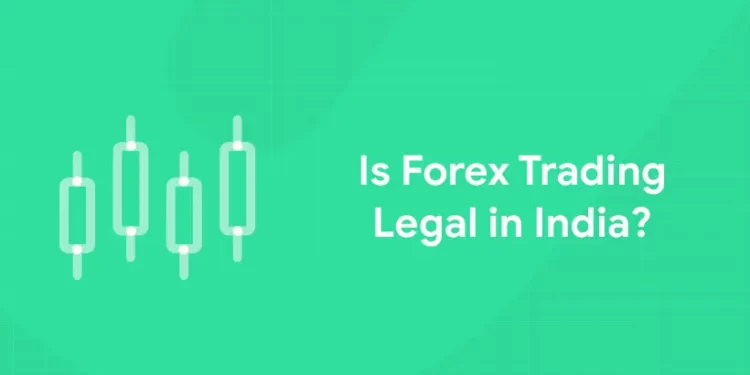Table of Contents
Forex trading is something that piques the interest of people who are looking into ways for building wealth. It is soon gaining popularity among the investors and traders in India with the enormous gains and opportunities they provide to try their luck in foreign markets. Globalisation has made forex trading a valuable part of the economy. It becomes a part of our life even without our knowledge. But there is one important question that needs to be asked before getting into forex trading. Is Forex trading legal in India? Are there any guidelines one need to follow to do forex trading in India? What are the repercussions if you fail to comply to these restrictions? Let us learn more about the legal and regulatory side of forex trading in India and answer the question ‘Is Forex trading legal in India?’.
Click here to learn more about forex trading from expert mentors of Entri app!
What is Forex Trading?
Globalisation has almost removed all the barriers that were there in midst of global trading. It is now very easy to trade with people from other nations. But to do so, we would need foreign currency. This is where foreign exchange comes into play.
Forex trading is also known as currency trading in India. It is a market in which we trade a currency for another. We could also say that it is the purchasing and selling of currencies in a decentralised global level market. This market operates 24*5 and this makes it the largest global level trading platform. The forex is similar to stocks and allows you to speculate the movements in currency prices.
Is Forex trading legal in India? Learn the legal side of forex trading in India with experts!
Is Forex Trading Legal in India?
1: What is a stock?
Yes! Forex trading is legal in India. But it is conducted withing a very strictly regulated framework. These frameworks are made by certain governing bodies. The role of these regulations is to safeguard the traders from losses. Let’s explore and learn more about the legal dimensions that regulate the forex trading in India.
The legality of forex trading is often questioned in many platforms. It is legal but is subjected to various regulations and restrictions. The forex trading is not illegal in India. But a forex trader in India can only trade through dealers of Securities and Exchange Board of India (SEBI). To understand the legal side of forex trading better, we can divide forex trading into two.
Spot Forex Trading
Spot forex trading is the term for trading in which a trader actually and physically owns currency with another individual.
Forex Trading Via Derivative Instruments
Derivative instruments consist of options and futures. Hedging one’s currency is beneficial for large corporations that do business with foreign companies. The Reserve Bank of India, the highest authority overseeing foreign exchange in India, has outlawed this type of FX trading and declared it illegal. It is in charge of making all important decisions and overseeing foreign exchange regulation. It is not against the law for Non-Resident Indians (NRIs) to trade foreign exchange in India.
Start Your Stock Market Journey Today!
Learn practical strategies, minimize risks, and grow your wealth confidently. Enroll now and take your first step toward financial success!
Know moreThe Beginning of Forex Trading Regulations in India
In earlier days, there were no regulations governing forex trading in India. So, there was no restrictions when it came to foreign currency exchange in India. The nation’s foreign exchange reserves then began to decline after a few years. The Foreign Exchange Regulation Act of 1973 was created to remedy this. Nevertheless, FERA was unable to effectively impose restrictions, and as a result, the value of the Rupee declined in 2013. In order to adapt to the shifting conditions in the foreign exchange market, the Central Government repealed and modified the Foreign Exchange Regulation Act. The Foreign Exchange Management Act of 1999 was a new law that was designed to fit the conditions of the market. It became effective on June 1st, 2002.
India adopted a new philosophy for managing and regulating foreign exchange, one that was more liberal and pragmatic than the previous one of saving foreign exchange. In addition to being active, the Reserve Bank of India has established a number of guidelines and policies to control foreign exchange trading in the country.
FERA or FX Regulation Act, 1973
The FX Regulation Act was first proposed by the Indian government with the intention of protecting the country’s foreign exchange reserves. The FX Regulation Act, 1973 (FERA) administered India’s FX control system until June 2000. The continued process of economic liberalization has led to many revisions to FERA, particularly with regard to international trade and investment. India was experiencing a trade deficit, which resulted in currency devaluation and rising import oil prices. FERA outlined the types of foreign exchange transactions that were allowed, including those involving residents of India and non-residents. FERA aimed to control the outflow of Indian currency, monitor securities and foreign exchange operations, regulate transactions that indirectly affect foreign exchange, and control the import and export of cash and bullion, among other things.
Join the best online forex trading coaching course offered by the Entri App!
FEMA or FX Management Act, 1999
The FERA was superseded by the FEMA (FX Management Act) 1999 in light of the continued economic liberalization and strengthening FX reserves position during the 1990s. A person residing in India is fully permitted under FEMA to possess or transfer any foreign securities or real estate located outside of the country. These days, among other things, FEMA is in responsibility of permitting international trade and payments, encouraging the orderly management of the foreign exchange market in India, controlling foreign money in India, and addressing payment imbalances.
Start Your Stock Market Journey Today!
Learn practical strategies, minimize risks, and grow your wealth confidently. Enroll now and take your first step toward financial success!
Know moreAuthorities With Duty to Enforce FEMA 1999
Certain authorities are given the duty to enforce FEMA 1999 in Indian Market. They are listed below.
- Foreign Exchange Department of Reserve Bank of India
- Directorate of Enforcement of Department of Revenue of the Ministry of Finance
- Capital Markets Division, Investment Division and Foreign Trade Division of Department of Economic Affairs under the Ministry of Finance
Machinery responsible for FEMA Enforcement
The Foreign Exchange Management Act’s various components are overseen by a bureaucratic machinery. Let us get to know a few among them.
Enforcement Directorate
The Central government has appointed the Enforcement Directorate, or a group of officers in addition to the Directorate, to look into the Foreign Exchange Management Act’s specifications. Its responsibility is to stop foreign exchange leaks that may occur as a result of some people’s malpractice. Both the finding of these cases and their resolution fall under the purview of the Directorate.
Adjudicating Authority
Anyone who violates the Foreign Exchange Management Act, its regulations and rules, or the Reserve Bank of India’s policies would receive a warning from this authority.
Special Director (Appeals)
An individual may file an appeal with the Special Director if they feel that the Adjudicating Authority’s decision is unfair to them.
Appellate Tribunal
The Appellate Tribunal is the place to file an appeal if you feel that the decision made by the Special Director or the Adjudicating Authority is unfair to you.
Foreign Exchange Department of the RBI
It was previously called the Exchange Control Board. It oversees the Foreign Exchange Management Act of 1999 and current account transactions, with the exception of a few listed by the Central Government. There is no need to obtain RBI permission for this. The banks that are permitted to handle foreign exchange have a wide range of authority.
Department for Promotion of Industry and Internal Trade (DPIIT) also plays a role in enforcing FEMA 1999.
What Counts as Foreign Exchange According to FEMA?
According to the FEMA 1999, the following things will count as foreign exchange.
- balances, credits, and deposits that must be paid in foreign currencies.
- drafts, traveler’s checks, credit letters, or bills of exchange expressed or drawn in Indian currency but payable in foreign currency.
- drafts, travelers’ checks, letters of credit, or bills of exchange made payable in Indian rupees but drawn by banks, organizations, or individuals outside of India.
Prohibitions Listed in FEMA 1999
Some types of dealings are strictly prohibited under FEMA 1999. A few from such guidelines are listed below.
- Dealing with or transferring foreign currency or foreign securities to anybody who is not an authorized person is prohibited by the Act.
- Any payment to or credit to any resident of a country other than India is forbidden.
- It is forbidden for an Indian to accept money directly from, or on behalf of, a resident of another country.
- It is forbidden for an Indian to engage in any such financial transaction in India with the intention of purchasing an asset outside of the country.
Surrendering of Foreign Exchange
If someone who is not an Indian resident earns foreign currency and it is not utilized for authorized purposes, it must be turned in within 60 days of the purchase or acquisition. The foreign money that has been acquired traveling abroad has to be surrendered withing 90 days if it has been taken as cash and coins and 180 days if it was given as travellers’ cheque or is acquired by an individual who is resident in India. But this is in the case of large sums of money. Small amounts of foreign exchange released for travel does not require any notifications to or approval from RBI.
Amount that can be Released without RBI Permit
In a financial year i.e. 1st April to 31st March it is permitted to release up to 10,000 US Dollars for a private visit outside India. There are exceptions for Bhutan and Nepal in the case of this law. It is permitted to release 25,000 US Dollars for business visits and if someone is moving out of India for education, healthcare purposes or employment, they can take up to 1,00,000 US Dollars.
Penalties for violation of Provisions under FEMA 1999
Section 13 of the FEMA details the punishments and penalties associated with forex trading law violations in India. If any person violates any of the rules, regulations, and notifications contained in this Act, or any condition subject to which an authorisation has been issued by the Reserve Bank of India, such person may face a penalty of up to three times the amount involved in such violation in places where such amount is quantifiable.
In circumstances when the value cannot be specified, it can be as much as Rs 2 lakh. In circumstances where the infringement continues, Rs 5,000 might be charged for each day it continues. The adjudicating authority ruling on a case of violation of this Act or any of its rules may, in addition to the penalties listed above, opt to confiscate the foreign exchange assets of the person who committed the offense in question. This can be returned to India or kept outside of India, based on the directions of the relevant authorities.
How To Forex Trade Under FEMA 1999?
Permitted currency transactions must be conducted electronically only on electronic trading platforms (ETPs) approved by the RBI or on approved stock exchanges such as the National Stock Exchange of India (NSE), the BSE, and the Metropolitan Stock Exchange of India (MSE). ETP refers to any electronic system, other than an authorized stock exchange, via which transactions in qualifying instruments such as shares, money market instruments, foreign exchange instruments, derivatives, and so on are contracted. Indian residents who engage in currency trades with unlicensed individuals or on unauthorized ETPs may face FEMA penalties.
Get the best online mentoring for forex trading coaching from the Entri app!
SEBI Rules 2019
SEBI’s rules and regulations control registration, eligibility requirements along with investment limitations. It also investigates the compliance requirements and registration of foreign portfolio investors (FPIs). FPIs engage in Indian assets on behalf of their international clientele.
What is the Role of SEBI in Forex Trading in India?
The Indian forex trading market is regulated by SEBI, the Securities and Exchange Board of India. It is regarded as the principal regulator of the Indian capital markets, ensuring that companies follow the provisions of the 1999 Foreign Exchange Management Act (FEMA). SEBI is the regulatory body that was set up under Section 3 of the SEBI Act 1992 to safeguard the interests of securities investors, encourage the growth of the securities market, and handle issues that are related to or incidental to it. It was first created in 1998 as a non-statutory body, but the SEBI Act of 1992 later granted it statutory authority. Its primary duties consist of:
- Broker and agent registration.
- Notifications about Policies and Guidelines.
- Imposition of Charges.
- Investment Scheme Regulator.
- Outlaws Unfair Trade Practices.
Authorised Forex Trading Platforms in India
Some of the forex trading platforms that are recognised and licensed by RBI and SEBI are listed below.
- NSE (National Stock Exchange)
- MCX-SX (Multi Commodity Stock Exchange)
- BSE (Bombay Stock Exchange)
- NSE IFSC
Brokers approved by the Securities and Exchange Board of India (SEBI), such as Zerodha, Motilal Oswal, and Upstox, are able to conduct trades. The traders would be further connected to any of the three National Stock Exchanges through these brokers.
Seven Currency Pairs Allowed in India forex Trade
Foreign exchange trading is only permitted through these pairs. The Reserve Bank of India has set forth the exempted pairs under the Financial Exchange Management Act, 1999. They are listed below.
- USDINR i.e. (US Dollar- Indian Rupee)
- GBPINR i.e. (Pound Sterling- Indian Rupee)
- EURINR i.e. (Euro- Indian Rupee)
- JPYINR i.e. (Japanese Yen- Indian Rupee)
The Reserve Bank of India relaxed its regulations in 2015 and permitted an additional three cross-currency pairs. They are listed below:
- EURUSD i.e. (Euro- US Dollar)
- GBPUSD i.e. (Pound Sterling- US Dollar)
- USDJPY i.e. (US Dollar- Japanese Yen)
Prohibition on Foreign Brokers
Foreign currency brokers that operate offshore are not subject to Indian law. Since SEBI does not oversee them, an Indian national is not permitted to do business with them. Such trading is prohibited.
International Market Regulators
Due to its size, volatility, and lack of a single authority, the global foreign exchange market is heavily regulated by international authorities. Different nations’ central regulatory organizations are in charge of policing their own markets. FX trading always involves two countries because it typically requires selling one currency to buy another. The degree of regulatory compliance between these two nations could not be the same. The Financial Conduct Authority (FCA) and the Cyprus Securities and Exchange Commission (CySEC) serve as important regulatory authorities. While both of these regulatory agencies maintain tight guidelines and tough penalties for violators, they also provide brokers and dealers some leeway to operate in a comparatively open market. The SEBI, which imposes the aforementioned strict regulations, is substantially different from this. We will discuss some differences in the next paragraph.
For example, the Markets in Financial Instruments Directive, or MiFID, requires both the FCA and CySEC to comply. In addition to enabling trustworthy FX brokers with headquarters in one EU country to do business throughout the EEA, it also imposes regulations. Brokers are required by MiFID legislation to give investors statutory compensation in the event that the broker files for bankruptcy, which takes the form of a refund of deposited cash. Additionally, MiFID mandates that brokers keep segregated and audited accounts for the money of their clients in addition to enforcing regulations like the minimum capital requirement. However, the SEBI does not impose any further guidelines or requirements on its brokers, such as negative balance protection or separate accounts for customer funds. Indian traders are therefore not as well-protected in this regard and bear the risk and profit of their own trading decisions.
Is Forex trading legal in India? What are legal dimensions of Forex trading! Learn today!
Why Forex Traders in India Should Comply with the Laws?
It takes strict adherence to regulations to preserve the integrity of the dynamic and intricate currency trading industry. Financial, operational, and reputational hazards are only a few of the consequences that can arise from noncompliance in currency trading in India. Operational risks include the disruption of corporate operations as a result of legal and regulatory infractions, while financial risks involve capital loss as a result of unethical practices. Reputational hazards include harm to the company’s standing brought on by unethical behaviour, which may result in a decline in business and legal action. Upholding moral standards in currency trading in India is essential to preserving the integrity of the market. Maintaining openness, avoiding conflicts of interest, and adhering to all legal and regulatory obligations are examples of ethical behaviours.
Steps to Ensure Compliance While Forex Trading in India
Market players in India must take a number of measures to guarantee compliance while trading currencies, including as keeping meticulous records of every transaction, auditing trading activity on a regular basis, and putting strong risk management procedures in place. It is imperative for participants to guarantee that their staff members receive training on compliance requirements and ethical practices. Staying informed about any changes to laws and regulations is another essential step in ensuring compliance. To guarantee compliance, participants must keep up with applicable rules and regulations and make the required adjustments.
Advantages of Following the Rules While forex Trading in India
In India, traders can benefit from following regulatory guidelines in currency trading in more ways than merely avoiding fines and legal issues. The following are a few of the principal benefits of upholding compliance:
Enhanced Credibility and Reputation
Adhering to regulatory mandates has the potential to enhance traders’ credibility and good name in the marketplace. Clients, counterparties, and other market participants may become more trusting as a result. A good reputation can aid dealers in gaining new clients and building lasting connections.
Getting to Know New Customers and Markets
Some regulatory organizations need currency traders to hold special licenses or certificates in order to operate in certain markets. Traders who meet these conditions have the opportunity to reach new markets and clientele that they might not have otherwise been able to serve.
Improved Risk Management
Regulations frequently provide instructions for mitigating and managing risk. By adhering to these rules, traders can enhance their performance and prevent losses by more effectively recognizing and controlling the risks involved in their trading activity.
The Advantage Over Competitors
Traders who adhere to regulatory standards may have an advantage over their competitors. Customers and counterparties are more inclined to transact with traders who have a solid reputation in the market and who are known to adhere to moral and legal standards.
Peaceful Mind
Finally, compliance with regulatory regulations can provide traders with peace of mind by ensuring that they are operating inside the legal and ethical framework. As a result, traders may feel less stressed and be able to concentrate on their trading activity without being sidetracked by possible legal or regulatory problems.
Is Forex trading legal in India? Learn the laws and regulations of forex in India with experts!
Is Forex trading legal in India: Conclusion
Although it is possible to trade foreign exchange from within India, traders must consider a number of criteria and the restrictions imposed by the nation’s regulatory organizations. It is evident that the laws governing the Indian forex market are more stringent than those governing certain other markets abroad. However, with the growth of internet technology and the rise of online brokers, the distance between Indian traders and the international forex market is gradually decreasing. Numerous trustworthy foreign brokers enable their Indian traders to take use of local deposit choices.
Start Your Stock Market Journey Today!
Learn practical strategies, minimize risks, and grow your wealth confidently. Enroll now and take your first step toward financial success!
Know moreFrequently Asked Questions
Which law rules the forex trade in India?
FEMA or FX Management Act, 1999 is the law that regulates forex trade in India.
Which is the main governing body which regulates forex trade in India?
SEBI is the main governing body which regulates forex trade in India.











